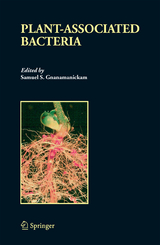Plant-Associated Bacteria
Springer-Verlag New York Inc.
978-1-4020-4536-3 (ISBN)
The idea of developing a comprehensive volume on PLANT-ASSOCIATED BACTERIA was born in my mind about 5 years back. I decided therefore that the proposed volume on Plant-Associated Bacteria will be a complete volume on plant bacteriology. There are several books on symbiotic and beneficial bacteria. There are also books and volumes on plant pathogenic bacteria. In recent years, the pla- growth promoting rhizobacteria (PGPR) has emerged as an important group which has significant applications to crop production and biological disease control. There is a vital need for a comprehensive volume on all plant-associated bacteria that also includes epiphytic and endophytic bacteria. In my mind, the proposal appeared worthwhile and timely. In the present era of genomics, there has been an enhanced interest in the genomics of the plant-associated bacteria (Example: the Plant-Associated Microbe Genome Initiative, American Phytopathological Society–www.apsnetorg/ media/ ps/top.asp). Traditional methods of identification of bacteria have been replaced by molecular methods for diagnostics and their phylogeny. This volume tries to carefully document both the traditional and recent methods. To achieve this, the contributors have been chosen from among the best experts to provide updated information for a reader who has specific expectations in a volume of this nature.
The Editor, Sam Gnanamanickam, is a plant pathologist and a rice biotechnologist. He obtained his Ph.D degree in plant pathology from the University of Hawaii in 1976. On his return to India he took up a lecturer's position in plant pathology at the Centre for Advanced Studies in Botany of the University of Madras, India in 1978 and has moved up as Reader and Professor in the same Department. He has had postdoctoral training at Agriculture Canada (1980-82) and was a Visiting Scientist at the International Rice Research Institute (IRRI), Los Banos, Philippines during 1987-89. He was associated with the International Rice Biotechnology net-work program supported by the Rockefeller Foundation for 10 years (1990-2000) which helped him to develop collaborative research with several advanced laboratories on molecular breeding of rice and biological control of rice diseases. He was accepted as an Adjunct Professor of Plant Pathology at the University of Arizona in 2004 and was elected as a Fellow of the National Academy of Agricultural Sciences, New Delhi in 2005. His earlier book on Biological Control of Crop Diseases was published by Marcel Dekker, NY, 2002.
Beneficial Bacteria.- Plant-associated bacteria: survey, molecular phylogeny, genomics and recent advances.- Rhizobium-legume symbioses: molecular signals elaborated by rhizobia that are important for nodulati.- Nitrogen-fixing bacteria in non-legumes.- Epiphytic bacteria, their ecology and functions.- Bacterial endophytes: The endophytic niche, its occupants, and its utility.- Rhizosphere Bacteria.- Plant growth-promoting rhizobacteria.- Contribution of studies on suppressive soils to the identification of bacterial biocontrol agents and to the knowledge of their modes of action.- Root-associated bacteria inducing systemic resistance.- Rhizosphere competence and the role of root colonization in biocontrol.- Deleterious Rhizobacteria.- Plant Pathogenic Bacteria.- Agrobacterium biology and crown gall disease.- Clavibacter michiganensis, a group of gram-positive phytopathogenic bacteria.- The soft rot Erwinia.- Plant pathogenic Pseudomonas species.- Virulence functions of xanthomonads.- Plant pathogenic Ralstonia species.- Burkholderia.- Plant pathogenic members of the genera Acidovorax and Herbaspirillum.
| Zusatzinfo | X, 712 p. |
|---|---|
| Verlagsort | New York, NY |
| Sprache | englisch |
| Maße | 155 x 235 mm |
| Themenwelt | Naturwissenschaften ► Biologie ► Botanik |
| Naturwissenschaften ► Biologie ► Genetik / Molekularbiologie | |
| Naturwissenschaften ► Biologie ► Mikrobiologie / Immunologie | |
| ISBN-10 | 1-4020-4536-0 / 1402045360 |
| ISBN-13 | 978-1-4020-4536-3 / 9781402045363 |
| Zustand | Neuware |
| Haben Sie eine Frage zum Produkt? |
aus dem Bereich




